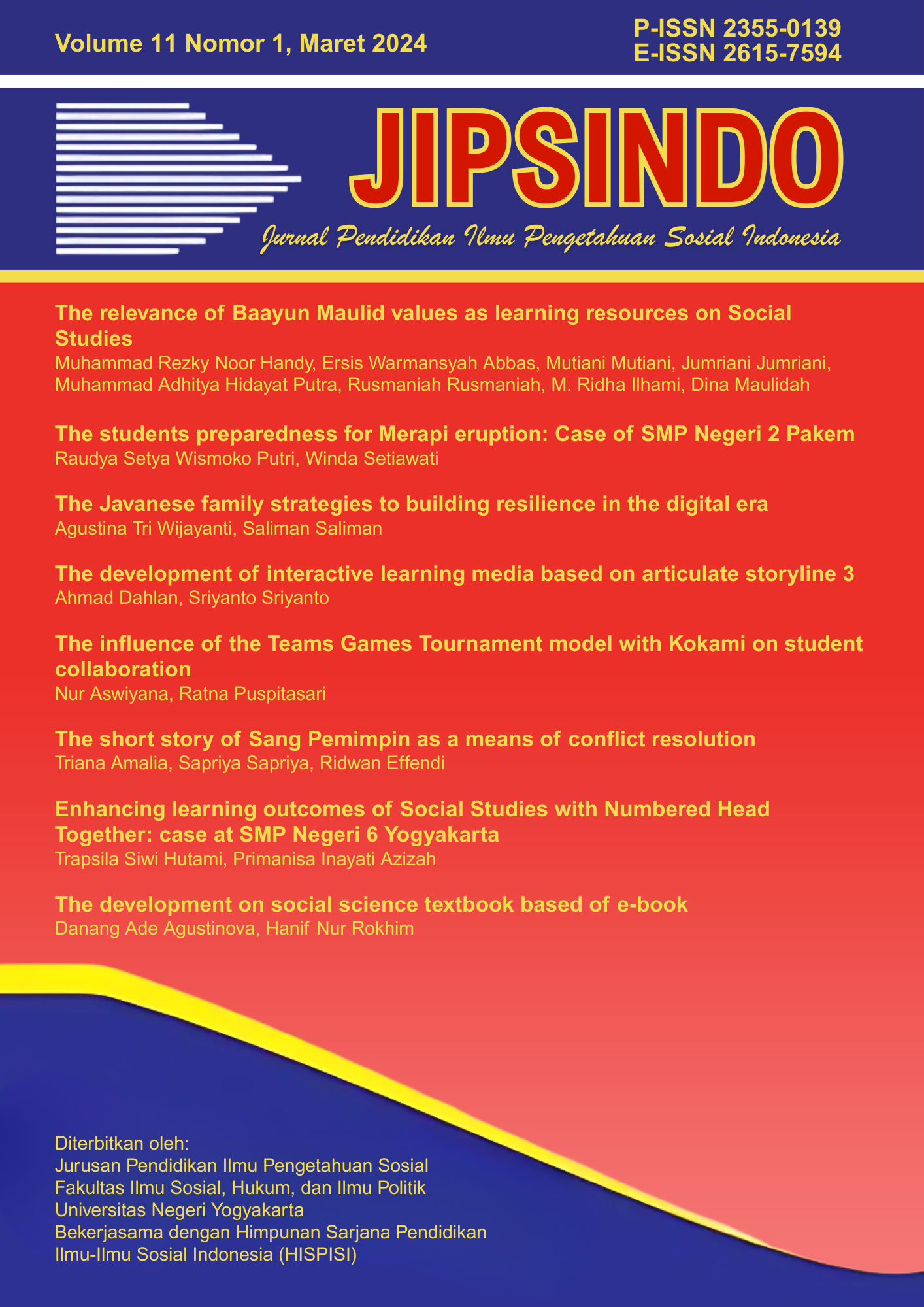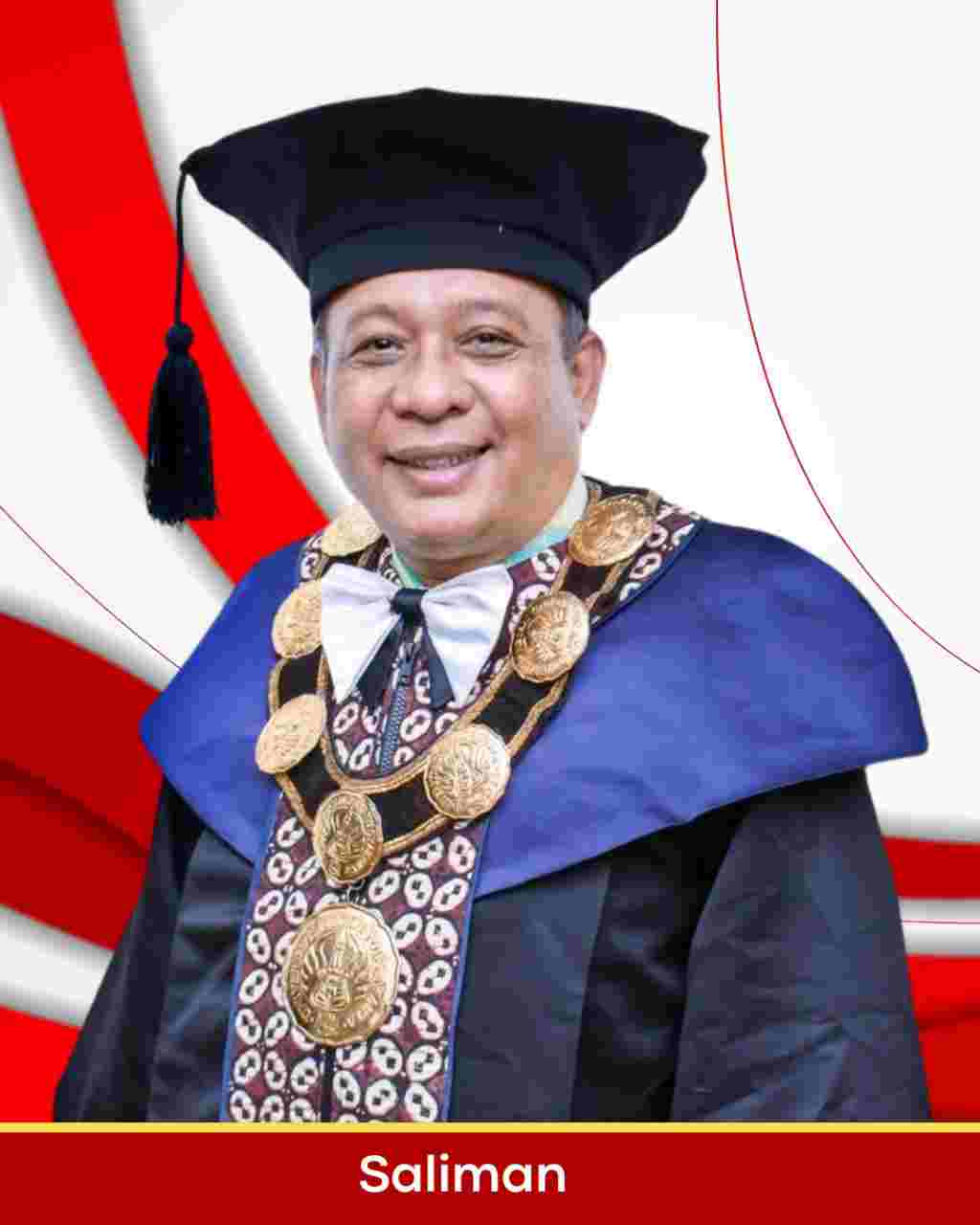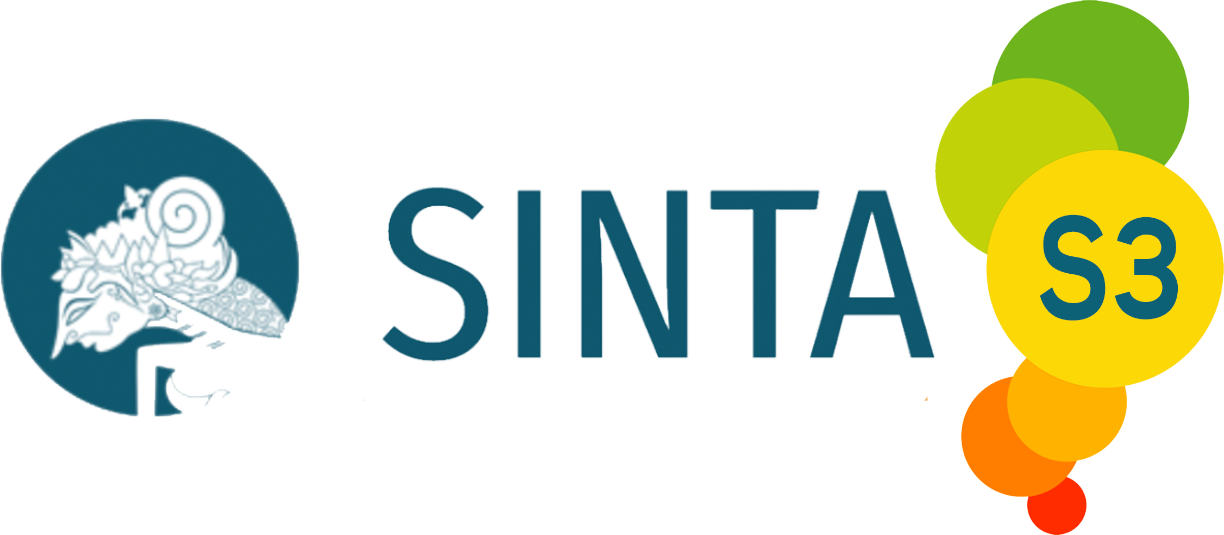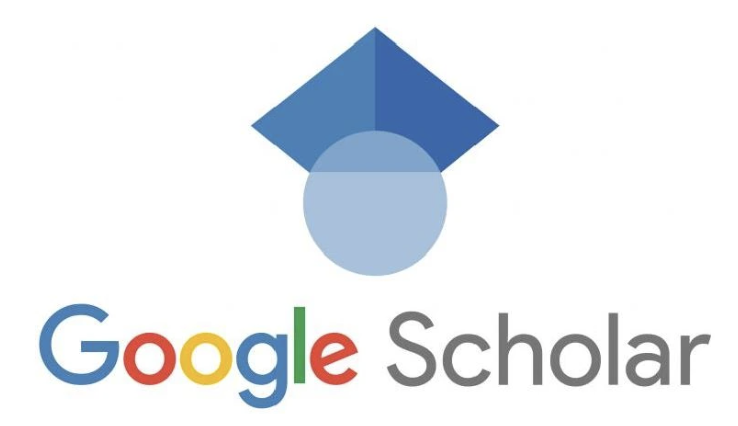Hakikat Ilmu Pengetahuan Sosial: Strategi memahami dan perbaikan kesalahan konsep
DOI:
https://doi.org/10.21831/jipsindo.v9i1.47435Keywords:
hakikat, IPS, strategi, memahamiAbstract
Penelitian bertujuan untuk merumuskan strategi memahami hakikat IPS bagi calon guru. Metode yang digunakan adalah Systematic Literature Review (SLR) dengan mengedepankan relevansi tema artikel terdahulu sebagai dasar koleksi data. Analisis data dilakukan dengan teknik analisis data interaktif. Hasil penelitian menunjukan bahwa sangat mungkin seorang Sarjana Pendidikan IPS dapat memahami hakikat IPS saat masa studi apabila sistem belajar IPS dapat mengedepankan penekanan pada konsep integrated dan mengikuti tradisi IPS yang ada. Diskusi sebagai langkah demokratis perlu dikedepankan untuk menyadarkan peserta didik tentang pentingnya belajar IPS, sehingga pemahaman yang dibangun bukan sekedar normatif, tetapi yang diharapkan adalah bersifat kritis. Pemahaman yang dibangun dilandaskan pada keinginan bertanya dan mengetahui, bukan informasi searah yang diberikan oleh pengajar ataupun buku teks. Sudah saatnya bidang studi IPS lebih terbuka dan demokratis dalam membentuk karakter guru yang memahami hakikat IPS dalam mendukung pembangunan sumber daya manusia nasional yang sedang dilakukan.
The nature of Social Sciences: Strategy to understanding and revised on concept false
This study aims to formulate strategies to understand the nature of social studies for prospective teachers. The method used is Systematic Literature Review (SLR) by prioritizing the relevance of the theme of the previous article as the basis for data collection. Data analysis was carried out using interactive data analysis techniques. The results of the study indicate that it is very possible for a Bachelor of Social Studies Education to understand the nature of social studies during the study period if the social studies learning system can put an emphasis on integrated concepts and follow the existing social studies tradition. Discussion as a democratic step needs to be put forward to make students aware of the importance of learning social studies, so that the understanding that is built is not just normative, but what is expected is critical. The understanding that is built is based on the desire to ask and know, not unidirectional information given by the teacher or textbook. It is time for the field of social studies to be more open and democratic in shaping the character of teachers who understand the nature of social studies in supporting the ongoing development of national human resources.
References
Akkaymak, G. (2014). Neoliberal ideology in primary school social studies textbooks in Turkey. Journal for Critical Education Policy Studies (JCEPS), 12(3).
Aziz, A. (2016). Meminimalkan kesalahan pemahaman konsep tarif pajak penghasilan pada siswa Kelas VIII C SMP Negeri 7 Pekalongan melalui media balok uang bersusun. Harmony: Jurnal Pembelajaran IPS Dan PKN, 1(1), 85–98.
Barr, R., Barth, J. L., & Shermis, S. S. (1978). The nature of the social studies. ETC.
Barr, R. D., Barth, J. L., & Shermis, S. S. (1977). Defining the social studies. National Council for the Social Studies Washington, DC.
Brooks, S. (2009). Historical empathy in the social studies classroom: A review of the literature. Journal of Social Studies Research, 33(2).
Burcu, S. E. L., & Sí–ZER, M. A. (2020). Change and continuity perception skills in social studies curriculum in turkey and america within the scope of teaching historical time. UÅŸak íœniversitesi EÄŸitim AraÅŸtırmaları Dergisi, 6(1), 1-19.
Chen, H., De, P., Hu, Y. J., & Hwang, B.-H. (2014). Wisdom of crowds: The value of stock opinions transmitted through social media. The Review of Financial Studies, 27(5), 1367–1403.
Cheng, S. K. T., & Ho, K. K. (2012). A reflective learning taxonomy for an educational tour. Educational Research for Policy and Practice, 11(3), 243–260.
Ediger, M. (2007). Philosophy of social studies education. Journal of Instructional Psychology, 34(1).
George, A. L., Bennett, A., Lynn-Jones, S. M., & Miller, S. E. (2005). Case studies and theory development in the social sciences. mit Press.
Giroux, H. A., & Penna, A. N. (1979). Social education in the classroom: The dynamics of the hidden curriculum. Theory & Research in Social Education, 7(1), 21–42.
Gí¼nel, E. (2016). Infusing global perspectives in social studies education in Turkey: Pre-service social studies teachers. Turkish Online Journal of Qualitative Inquiry, 7(4), 440-461.
Hutchins, R. (2016). Nationalism and history education: Curricula and textbooks in the United States and France. Routledge.
Jones, B. C., DeBruine, L. M., Little, A. C., Burriss, R. P., & Feinberg, D. R. (2007). Social transmission of face preferences among humans. Proceedings of the Royal Society B: Biological Sciences, 274(1611), 899–903.
Karabulut, íœ. S. (2012). How to teach critical thinking in social studies education: An examination of three NCSS journals. Eurasian Journal of Educational Research, 49, 197–214.
Katilmis, A. (2017). Values education as perceived by social studies teachers in objective and practice dimensions. Educational Sciences: Theory and Practice, 17(4), 1231-1254.
Koí§oÄŸlu, E. (2015). Social Studies teachers' perspective of religion education in Turkey. International Online Journal of Educational Sciences, 7(1).
Levstik, L. S. (2008). What happens in social studies classrooms. Handbook of Research in Social Studies Education, 50–62.
Miles, M. B., Huberman, A. M., & Saldana, J. (2014). Qualitative data analysis: A methods sourcebook. Sage Publications, Inc.
Nasional, D. P. (2007). Naskah akademik kajian kebijakan kurikulum Mata Pelajaran Ilmu Pengetahuan Sosial (IPS). Jakarta: Badan Penelitian Dan Pengembangan Pusat Kurikulum.
Parker, W. C. (2015). Social studies education eC21. In Social Studies Today (pp. 13–24). Routledge.
Pramono, S. E. (2013). Hakikat pendidikan Ilmu Pengetahuan Sosial. Semarang: Widya Karya.
Purnomo, A., & Kurniawan, G. F. (2021, May). Environmental ethics in Indonesian Social Studies. In IOP Conference Series: Earth and Environmental Science (Vol. 747, No. 1, p. 012044). IOP Publishing.
Puspitasari, R. (2016). Kontribusi empirisme terhadap pendidikan Ilmu Pengetahuan Sosial. Edueksos: Jurnal Pendidikan Sosial & Ekonomi, 1(1).
Rother, E. T. (2007). Systematic literature review X narrative review. SciELO Brasil.
Ruja, I. N., & Wahyuningtyas, N. (2018). Inservice Guru MGMP IPS SMP Kabupaten Blitar dalam Pembelajaran Peta NKRI. Jurnal Praksis Dan Dedikasi Sosial (JPDS), 95–102.
Soemantri, M. N. (2001). Menggagas pembaharuan pendidikan IPS. Bandung: Remaja Rosdakarya.
Tarman, B., & Kılıní§, E. (2018). Poetry in the social studies textbooks in Turkey. Journal of Culture and Values in Education, 1(1), 50-62.
Utomo, C. B., & Kurniawan, G. F. (2017). Bilamana tradisi lisan menjadi media Pendidikan Ilmu Sosial di Masyarakat Gunungpati. Harmony, 2(2), 169–184.
Downloads
Published
How to Cite
Issue
Section
Citation Check
License
Authors who publish with this journal agree to the following terms:
- Authors retain copyright and grant the journal right of first publication with the work simultaneously licensed under a Creative Commons Attribution License that allows others to share the work with an acknowledgement of the work's authorship and initial publication in this journal.
- Authors are able to enter into separate, additional contractual arrangements for the non-exclusive distribution of the journal's published version of the work (e.g., post it to an institutional repository or publish it in a book), with an acknowledgement of its initial publication in this journal.
- Authors are permitted and encouraged to post their work online (e.g., in institutional repositories or on their website) prior to and during the submission process, as it can lead to productive exchanges, as well as earlier and greater citation of published work (See The Effect of Open Access).

JIPSINDO (Jurnal Pendidikan Ilmu Pengetahuan Sosial Indonesia) is licensed under a Creative Commons Attribution-ShareAlike 4.0 International License.
Based on a work at https://journal.uny.ac.id/index.php/jipsindo.
















